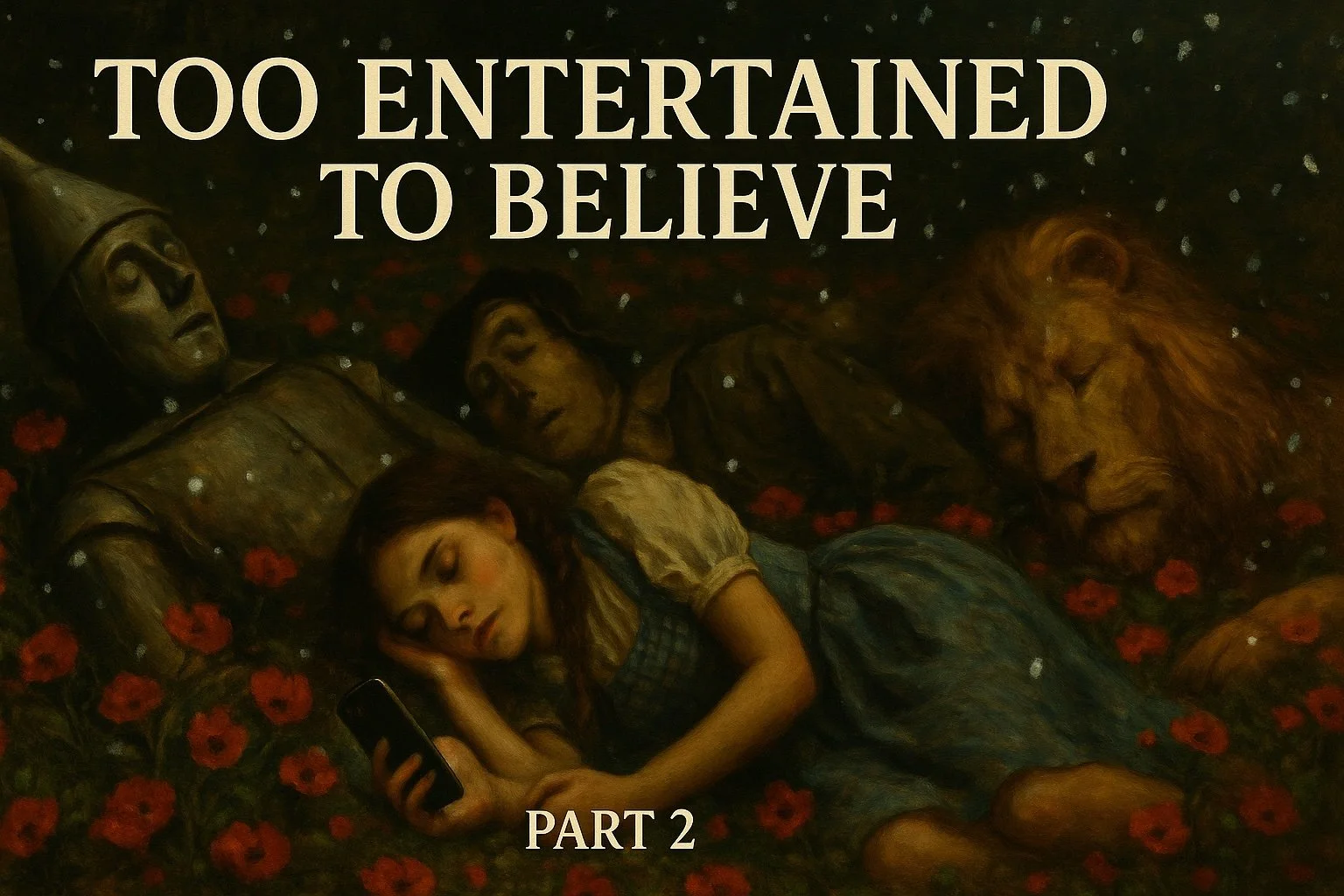Too Entertained to Believe Part 2
Wake Up Sleeper
Prior to 2018, western culture was careening at full speed toward a new and frightening reality. Smartphones gave us access to social media and the algorithms designed to hijack our hippocampus through continued hits of dopamine as we endlessly scroll through reel after reel of whatever excites or entrances us. Algorithms that often know us better than we know ourselves were designed to manipulate behavior and harvest data—fueling billions in ad revenue. One artist captured the phenomenon brilliantly by using photos of regular people walking, sitting with friends, lying in bed and then digitally removing the smartphones in their hands. The result was people engaging in life’s activity inexplicably looking down at their empty hand, hypnotized by some unseen force.
Just as this new reality was taking hold, a worldwide pandemic hit. Everyone was forced inside, and the last threads tying us to life before ‘doomscrolling’ were cut. If culture was a car screaming towards a cliff, Covid severed the brake lines as we sought to escape the doldrums of quarantine watching sour dough reels, dance challenges and endlessly applying face filters. The proverbial “cow” was now well outside the barn. Before the pandemic, we were already flirting with too much screen time. Apple even introduced Screen Time Reports to alert us to our habits, but most of us ignored them.
Then March 2020 hit. Screen time was no longer just a temptation; it became our lifeline to the outside world. Everything moved online. Church services, classrooms, meetings, birthdays, all became virtual. In our boredom and isolation, we self-medicated not with drugs or alcohol but with apps. A 2021 New York Times tech study of 1,600 Americans found that over half admitted to feeling hooked on their digital devices in the aftermath of lockdown. People reported symptoms similar to withdrawal when they tried to disconnect: irritability, anxiety, and an inability to concentrate. Ironic reels even surfaced of kids having their devices or Wi-Fi taken away, melting down with the intensity of narcotic withdrawal.
During those early lockdowns, American adults averaged over seven hours a day on digital media. TikTok surpassed Google as the most visited website. The average user spent 52 minutes a day on the app. Netflix added 36 million subscribers in 2020. YouTube, Facebook, and Instagram all reported record-breaking engagement. This is not just about wasted time. Psychologists observed increasing digital fatigue, attention fragmentation, and a diminished tolerance for boredom or silence. Spiritually, we lost the ability to sit in silence long enough to hear the still, small voice of God.
The spiritual cost was profound. Alan Noble, in You Are Not Your Own, observes that the existential question is no longer, "Is it true?" but "Why should I care?" Today, people are not rejecting the Gospel because they have carefully weighed the evidence; they are rejecting it because they are overstimulated, under-rested, and endlessly distracted, turning to various social media apps for one more hit of dopamine. We are not a skeptical culture; we are a sedated one.
There is a moment in The Wizard of Oz that feels oddly prophetic. Dorothy and her friends are almost to the Emerald City when they pass through a field of poppies. It is tranquil, too tranquil. They begin to feel sleepy. They lie down, just to rest their eyes. But it is a trap. The poppies do not comfort; they sedate. The risk is not an attack; it is forgetting where they were going. We didn’t see it coming. What felt like comfort turned out to be sedation. We are walking through our own poppy field; except the flowers are reels, push notifications, personalized ads, and face filters. We have been unsuspectingly lulled into a deep and fatal sleep unless something rouses us from our chemically induced slumber.
In the poppy fields of Oz, Glinda the Good Witch sends a gentle snowfall. It is quiet, cooling. It does not shock them awake; it rouses them just enough to remember who they are and where they are headed. For Christ-followers this new reality should change drastically the way we view our mission to the world. In previous generations, Christian witness was seen as a patient process of witness, example and evangelism. The present view of things is sobering: our friends, families, and neighbors lie comatose in a fatal slumber. With our own eyelids heavy from the same digital opium, our mandate now carries critical urgency. Christians have a unique ability to be the gentle snowfall that wakes the world around us.
We are living in a world where the natural drift is away from presence, meaning, and transcendence. COVID did not invent distraction; it removed the brakes. We cannot wake others until we first awaken ourselves. As Paul exhorted, ‘Wake up, sleeper, rise from the dead, and Christ will shine on you.’ (Ephesians 5:14)
